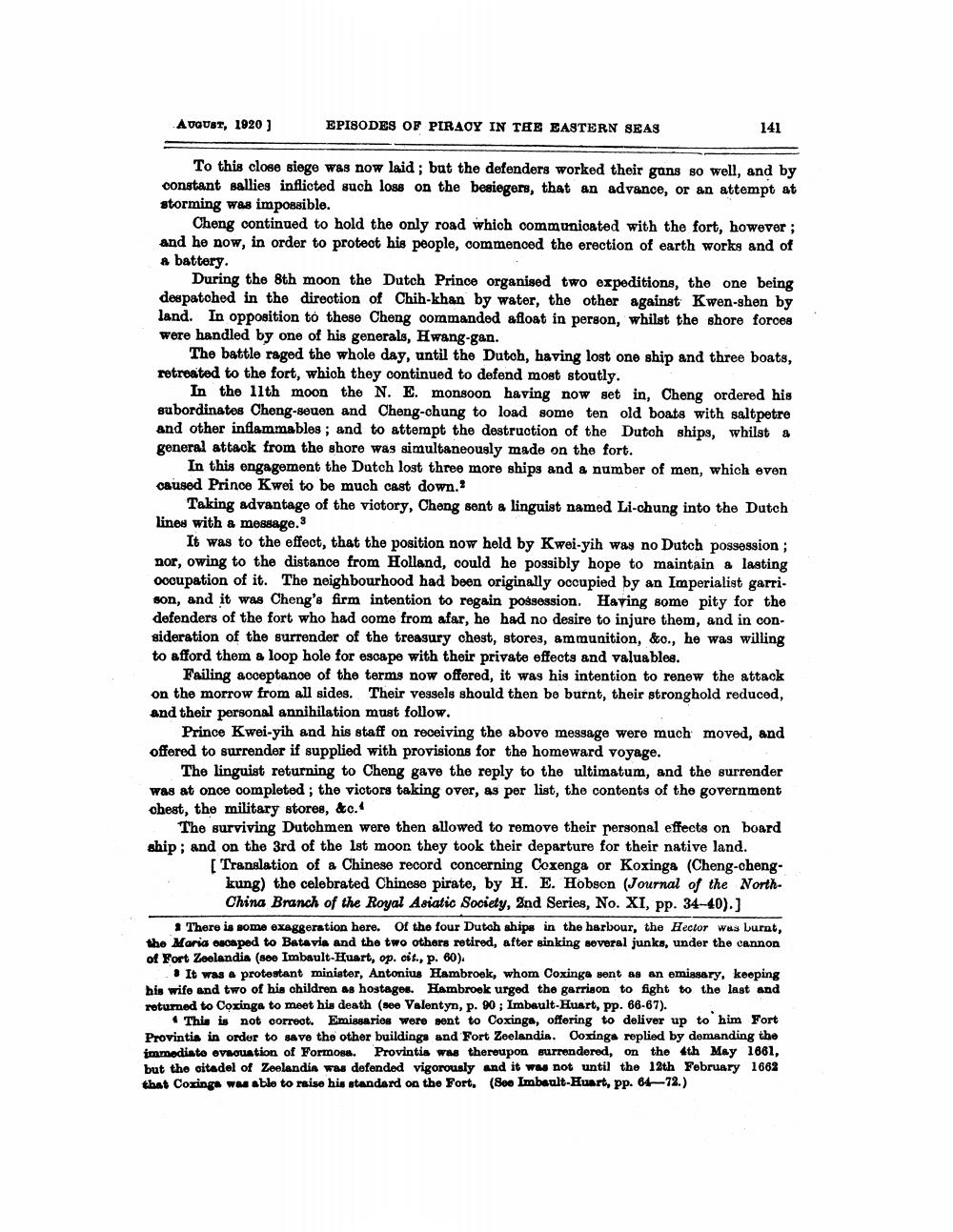________________
AVQUST, 1020
EPISODES OF PIRAOY IN THE EASTERN SEAS
141
To this close siege was now laid ; but the defenders worked their gans so well, and by constant sallies inflicted such loss on the besiegers, that an advance, or an attempt at storming was impossible.
Cheng continued to hold the only road which communicated with the fort, however; and he now, in order to protect his people, commenced the erection of earth works and of a battery.
During the 8th moon the Dutch Prince organised two expeditions, the one being despatched in the direction of Chih-khan by water, the other against Kwen-shen by land. In opposition to these Cheng commanded afloat in person, whilst the shore forces were handled by one of his generals, Hwang-gan.
The battle raged the whole day, until the Dutch, having lost one ship and three boats, retreated to the fort, which they continued to defend most stoutly.
In the 11th moon the N. E. monsoon having now set in, Cheng ordered his subordinates Cheng-seuen and Cheng-chung to load some ten old boats with saltpetre and other inflammables; and to attempt the destruction of the Dutch ships, whilst & general attack from the shore was simultaneously made on the fort.
In this engagement the Dutch lost three more ships and a number of men, which even caused Prince Kwei to be much cast down.
Taking advantage of the victory, Cheng sent a linguist named Li-chung into the Dutch lines with a message.3
It was to the effect, that the position now held by Kwei-yih was no Dutch possession ; nor, owing to the distance from Holland, could be possibly hope to maintain & lasting occupation of it. The neighbourhood had been originally occupied by an Imperialist garri. son, and it was Cheng's firm intention to regain possession. Having some pity for the defenders of the fort who had come from afar, he had no desire to injure them, and in consideration of the surrender of the treasury chest, stores, ammunition, &o., he was willing to afford them a loop hole for escape with their private effects and valuables.
Failing acceptance of the terms now offered, it was his intention to renew the attack on the morrow from all sides. Their vessels should then be burnt, their stronghold reduced, and their personal annihilation must follow.
Prince Kwei-yih and his staff on receiving the above message were much moved, and offered to surrender if supplied with provisions for the homeward voyage.
The linguist returning to Cheng gave the reply to the ultimatum, and the surrender was at once completed; the victors taking over, as per list, the contents of the government obest, the military stores, &c.
The surviving Dutchmen were then allowed to remove their personal effects on board ship, and on the 3rd of the 1st moon they took their departure for their native land.
[Translation of a Chinese record concerning Coxenga or Koxinga (Cheng-cheng
kung) the celebrated Chinese pirate, by H. E. Hobson (Journal of the North
China Branch of the Royal Asiatic Society, 2nd Series, No. XI, pp. 34-40). ] There is some exaggeration here. Of the four Dutch ships in the harbour, the Hector was burnt, the Maria oscaped to Batavia and the two others retired, after sinking soveral junks, under the cannon of Fort Zoolandia (800 Imbault-Huart, op. cit., p. 60).
It was a protestant minister, Antonius Hambroek, whom Coxinga sent as an emissary, keeping his wife and two of his children as hostages. Hambroek urged the garrison to fight to the last and returned to Coxinga to meet his death (100 Valentyn, p. 90; Imbault-Huart, pp. 66-67).
This is not correot. Emissaries were sent to Coxinga, offering to deliver up to him Fort Provintis in order to save the other buildings and Fort Zoelandia. Ooxings replied by demanding the immediato Vuation of Formose. Provintia was thereupon currendered, on the 4th May 1861, but the oitadel of Zeelandin was defended vigorously and it was not until the 12th February 1662 that Coxinga was able to raise his standard on the Fort, (See Imbault-Huart, pp. 61-72.)




